
June 22 - July 22
Cancer is a Water Sign
Cancer is a Cardinal Sign

Cancer is ruled by the Moon

June 22 - July 22
Cancer is a Water Sign
Cancer is a Cardinal Sign

Cancer is ruled by the Moon
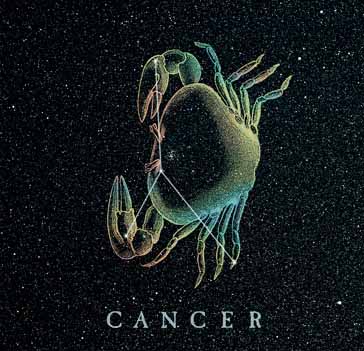
Cancer is an astrological sign, which is associated with the constellation Cancer. It spans the 90-120th degree of the zodiac, between 90 and 125.25 degree of celestial longitude, which the Sun transits this area on average between June 22 to July 22 each year.
And under the sidereal zodiac, it is currently from July 21 to August 9. The sign opposite to Cancer is Capricorn. The corresponding month in the Babylonian calendar is Arax Du'uzu, dedicated to Adar.
In medical astrology and in terms of anatomy, Cancer is said to rule the chests or breasts, epigastric region, elbows, stomach, digestive organs, upper lobe of the liver, thoracic duct, pancreas, blood serum, and the womb. Cancer, which can affect any part of the body, is sometimes said to have taken its name from this sign, which can therefore afflict its subjects with imperfections anywhere. This is incorrect, however, the derivation of cancer being the Latin cancer meaning gangrene as well as crab. nevertheless, Cancerians are said to be liable to breast cancer and to suffer from pleurisy, dropsy, piles and varicose veins. The excitability mentioned above can lead to weak digestion, gastritis and other stomach ills, and there is a tendency to coughs and weakness of vision.
Positive traits:
Emotional and loving
Intuitive and imaginative
Shrewd and cautious
Protective and sympathetic
Negative Traits:
Changeable and moody
Overemotional and touchy
Clinging and unable to let go
The Cancerian character is the least clear-cut of all those associated with the signs of the zodiac. It can range from the timid, dull, shy and withdrawn to the most brilliant, and famous Cancerians are to be found through the whole range of human activity.It is a fundamentally conservative and home-loving nature, appreciating the nest like quality of a secure base to which the male can retire when he needs a respite from the stresses of life, and in which the Cancerian woman can exercise her strong maternal instincts. The latter tends to like and to have a large family. 'Nest like' is an appropriate adjective for the Cancerian home, for its inhabitants tend to favour the dark, mysterious but comfortable type of house which has something of the air of a den about it, a place which belongs to the family rather than existing as a showcase to impress visitors.
That is not to say that the Cancerian is unsociable, just that for them there is a time to socialize and a time to be solitary, and this is part of the apparent contradiction in their nature. Outwardly they can appear formidable - thick-skinned, unemotional, uncompromising, obstinately tenacious, purposeful, energetic, shrewd, intuitive and wise, sometimes with a philosophical profundity of thought verging on inspiration.
Their intimates, however, may see a very different character, one with a sympathetic and kindly sensitivity to other people, especially those they love. They are able to identify with the situations of others because of the keenness of their imaginations. They are often over-imaginative and prone to fantasy, sometimes trying to shape their lives to fit some romantic ideal.
They are appreciative of art and literature, and especially of drama, where the spectacle and ebb and flow of action and feeling particularly excite them. They may themselves possess considerable literary, artistic or oratorical talent. Their sharp ears and talent for mimicry can sometimes give them success on the stage, though their tendency to be emotional may make them overact. Interestingly - because they give the impression of being down-to-earth - they are often fascinated by the occult and are more open to psychic influence than the average. If they can reconcile the personal conflict of their urge to be outgoing with the reserve that causes them to withdraw into themselves, then at best they can inspire a generation, especially the youthful part of it, by their idealism. A job in which they can express this, and in which they can do well, would be as a leader in a youth organization.
In their personal relationships they are mentally a mixture of toughness and softness, often emotional and romantic to the point of sentimentality in their fantasies; but in real life and in marriage, their loving is not so sentimental but tenaciously loyal. Even if they have affairs (and they may do so, for the male in particular is open to sensual stimulation), their first loyalty remains to spouse and family, of whom they regard themselves as the protector. Both the Cancerian man and woman love unreservedly, giving much and asking little in return - in fact, one of the most important lessons they have to learn is how to receive gracefully. They are too easily influenced by those they love and admire, and swayed by the emotion of the moment.
They are also loyal friends, the negative side of their faithfulness being clannishness, the narrow patriotism of "my country right or wrong"; and closing ranks in suspicion and coldness toward outsiders.
Cancerians have a retentive memory, particularly for emotionally laden events which they can recall in detail for years afterwards. they are strongly governed by childhood memories and since they live intensely in the past in memory and in the future in imagination, a chance meeting with someone for whom they had an unrequited love, even if they thought they had conquered the feeling, will easily rouse the emotion all over again.
The Cancerian has many potential faults. They can be untidy, sulky, devious, moody, inclined to self-pity because of an inferiority complex, brood on insults (very often imagined), yet are easily flattered. They can be tactless and difficult yet, because they are normally ambitious, they will curry favour by floating with majority opinions, outlooks and fashions of the day. As a result they often change their opinions and loyalties and, indeed, their occupations, and lack stability. They are easily corrupted and, because they are convincing romanticizers, can make successful confidence tricksters. Their romanticism in another sense make them ardent supporters of causes, for example a football team with whose heroes they can identify in a world of fantasy.
Their abilities fit the Cancerian for a wide range of occupations. As they are interested in what people are thinking and able to judge what they can safely be told, they can be good journalists, writers or politicians, though in this last capacity they are more likely to remain in the background rather than attain prominent positions of power. They may, indeed, change their party affiliations.
They can serve in other departments of public affairs, especially those which involve looking after others, for example in any kind of service from welfare and nursing to catering - their own love of comfort and good living makes the Cancerian an excellent chef or housekeeper. They sometimes have a penchant for trade or business and are often successful as a captain of industry. This is because they are excellent organizers with a good sense of value and economy which they may combine with a flair for inventiveness and originality. The romantic side of their natures make them enjoy grubbing about in places where exciting discoveries may be made (old stamp collections in attics, etc.), and if they can do this professionally as a secondhand dealer or specialist in antiques, they will be happy. More common occupations which suit some subjects of Cancer are real estate broker, gardener and sailor.
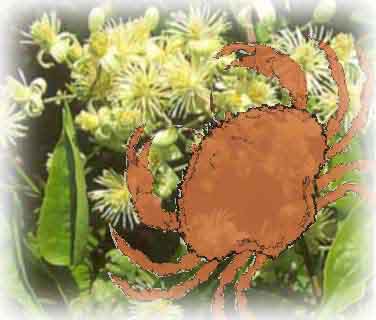
June 20/21 - Summer Solstice - 00 Cancer
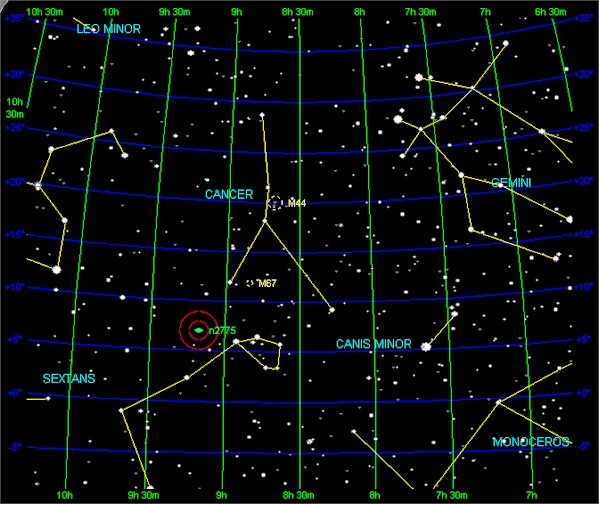
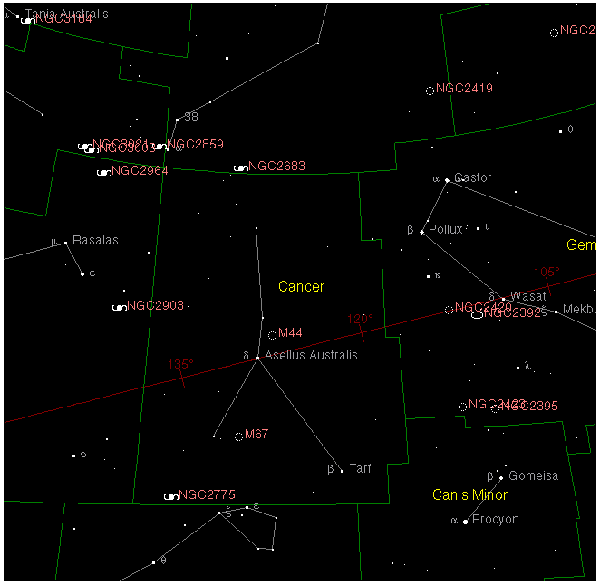
Cancer is one of the twelve constellations of the zodiac. Its name is Latin for crab and it is commonly represented as such. Cancer is relatively small among the constellations with an area of only 505 square degrees and its stars are rather faint. It lies between Gemini to the west and Leo to the east, Lynx to the north and Canis Minor and Hydra to the south. Cancer is the dimmest of the zodiacal constellations, having only two stars above the fourth magnitude.
Cancer is said to have been the place for the Akkadian Sun of the South, perhaps from its position at the summer solstice in very remote antiquity. But afterwards it was associated with the fourth month Duzu (June-July in the modern western calendar), and was known as the Northern Gate of Sun.
In the Egyptian records of about 2000 BC it was described as Scarabaeus (Scarab), the sacred emblem of immortality. In Babylonia the constellation was known as MUL.AL.LUL, a name which can refer to both a crab and a snapping turtle. On boundary stones, the image of a turtle or tortoise appears quite regularly and it is believed that this represent Cancer as a conventional crab has not so far been discovered on any of these monuments. There also appears to be a strong connection between the Babylonian constellation and ideas of death and a passage to the underworld, which may be the origin of these ideas in much later Greek myths associated with Hercules and the Hydra.
In the 12th century, an illustrated astronomical manuscript shows it as a water beetle. Albumasar writes of this sign in the work published in 1489 as a large crayfish. Jakob Bartsch and Stanislaus Lubienitzki, in the 17th century, described it as a lobster.
The Indian language Sanskrit shares a common ancestor with Greek, and the Sanskrit name of Cancer is Karka and Karkata. In Telugu it is "Karkatakam", in Kannada "Karkataka" or "Kataka", in Tamil Karkatan, and in Sinhalese Kagthaca. The later Hindus knew it as Kulira, the term originated by Proclus.
In Ancient Rome, Manilius and Ovid called the constellation Litoreus (shore-inhabiting). Astacus and Cammarus appear in various classic writers, while it is called Nepa in Cicero's De Finibus and the works of Columella, Plautus, and Varro; all of these words signify crab, lobster, or scorpion.
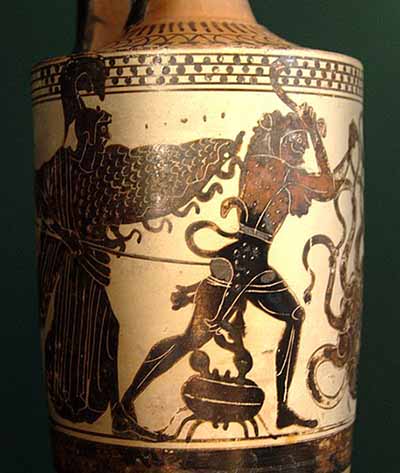
In Ancient Greece, Aratus called the crab which was followed by Hipparchus and Ptolemy. The Alfonsine tables called it Carcinus, a Latinized form of the Greek word. Eratosthenes extended this as the Crab, Asses, and Crib.
The creation of the constellation is explained in Greek mythology by the short-lived association of Karkinos with one of the Twelve Labors of Hercules, in which Hercules battled the multi-headed Lernaean Hydra. Hera had sent Karkinos to distract Hercules and put him at a disadvantage during the battle, but Hercules quickly dispatched the creature by kicking it with such force that it was propelled into the sky. Other accounts had Karkinos grabbing onto Hercules' toe with its claws, but Hercules simply crushed the crab underfoot. Hera, grateful for Karkinos' heroic effort, gave it a place in the sky. Some scholars have suggested that Karkinos was a late addition to the myth of Hercules in order to make the Twelve Labors correspond to the twelve signs of the Zodiac.
"The Age of the Great Mother"
began in ca. 8600 BC and ended in ca. 6450 BC.
Cancer is ruled by the Moon, and is associated with the process of bearing, birthing, nurturing, and protecting.
Widespread evidence of the mother goddess in the Near East -- the mother archetype in all shapes and forms is always related to the sign Cancer.
History: The Neolithic Revolution, including the beginning of civilization, with domestication of farm animals including pigs, goats and bees. Some nomadic people settled down to living in permanent dwellings. For example, the city of Jericho, believed constructed during this age, was protected by a wall 1217 ft (4 to 5 m) high & 5 ft (1.5 m) thick. (Cancer is always associated with 'protection' by utilizing an external barrier). There is also evidence of massive loss of coastal regions by the rising sea level following deglaciation of many areas on Earth. This loss of land caused the forced relocation of people to higher ground. Cancer's list of archetypes always include anything to do with the home (including houses, place of residence, migration).
Evidence of widespread use of boats (maritime vessels of all types are ruled by Cancer).
Rise of pottery (a protective vessel conforming to one of Cancer's archetypes).

The cancer symbol is like yin/yang, return to balance in
the water or sea of creation - the Simulation of Reality